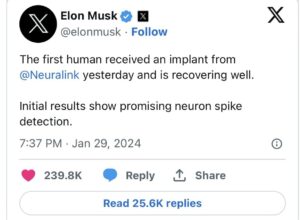The company Neuralink, founded by billionaire Elon Musk, recently presented an exciting video showing the advancements of its brain implant technology. The protagonist of the video is Noland Arbaugh, a 29-year-old man who became quadriplegic after a tragic car accident eight years ago. He became the first patient to receive a Neuralink brain chip implant, performed at the end of January.
In the video, shared on the old Twitter, Noland demonstrates surprising skills by moving a mouse pointer on a computer screen during a game of chess. This action, he claims, is performed through his thoughts. In his own words, Noland expresses gratitude for the opportunity: “I’m so lucky to be a part of this.”
However, even in the face of these advances, Noland highlights that the implant is still not perfect and recognizes that there are challenges to be overcome. He points out: “I don’t want people to think this is the end of the journey, there is still a lot of work to be done. But it has already changed my life.”
During the broadcast, led by Bliss Chapman, head of software at Neuralink, Noland shares his experience prior to the implant, highlighting the difficulty in playing chess since the accident. Now, he marvels at being able to perform tasks using just his brain.
Regarding the chip implantation procedure, Noland describes the surgery as “super easy” and expresses satisfaction with the result. “I was literally released from the hospital a day later. I don’t have cognitive disabilities,” he says. It is worth mentioning that Noland received the Neuralink implant in January of this year.
However, not everything is rosy. Last month, Reuters reported that U.S. Food and Drug Administration (FDA) inspectors found problems with record-keeping and quality controls for animal experiments at Neuralink, less than a month after the startup announced it had been authorized to test their brain implants on humans.
The company chose not to answer questions about the inspection by the FDA, the body responsible for approving experiments on animals and humans in the United States.
Despite the controversies, the impressive progress that Neuralink is making with the Noland Arbaugh case is undeniable. The progress achieved seems like something out of a science fiction plot. According to the company, this is just the beginning of the potential that this brain implant can offer in the future.
In addition to technological advances, it is important to consider the social and ethical impacts of this technology. The ability to connect the human brain directly to computers raises fundamental questions about privacy, security and individual autonomy. How to ensure that users’ brain data is protected from unauthorized access? How to avoid the misuse of technology to influence or control people’s thoughts? These are complex issues that require a careful approach and appropriate regulation.
However, despite the challenges, Neuralink’s future prospects are exciting. The company continues to advance its mission to develop next-generation brain-machine interfaces, with the ultimate goal of improving the quality of life for people with neurological disabilities and potentially opening new frontiers in the field of artificial intelligence and computing.
As Neuralink continues on its journey, it is crucial that we remain vigilant and engaged in the discussion about the benefits and risks of this innovative technology. Only in this way can we fully harness its potential while protecting the fundamental values and rights of humanity.
In conclusion, Neuralink’s journey reminds us of humanity’s incredible ability to overcome challenges and explore new horizons. This fusion between science and technology not only promises to revolutionize the way we interact with the world around us, but it also makes us reflect on what it means to be human.
As we witness extraordinary advances in the brain-machine interface, it is important to remember that these innovations have profound implications for each of us. We are entering uncharted territory, where the boundaries between mind and machine begin to blur.
But we must also approach this journey with empathy, understanding and responsibility. It is essential to consider not only the incredible potential of these technologies, but also the ethical, social and psychological challenges that arise along the way.
As we venture into this new world, we must remain united in our quest for a future where technology empowers us to achieve our wildest dreams, while preserving our humanity and the values that make us unique.
Neuralink represents not only a promise of scientific progress, but also an opportunity to reflect on what it truly means to be human. It is through this ongoing dialogue and collaboration that we will shape the destiny of this extraordinary journey we are on together.
Lilian Primo Albuquerque
Columnist, CEO at LPA Consultoria, Mentor, Advisor and Startup Investor
*This text does not necessarily reflect the opinion of the vehicle/ Cover photo: NurPhoto/Getty Images
Follow Adnews on Instagram e LinkedIn. #WhereTransformationHappens





